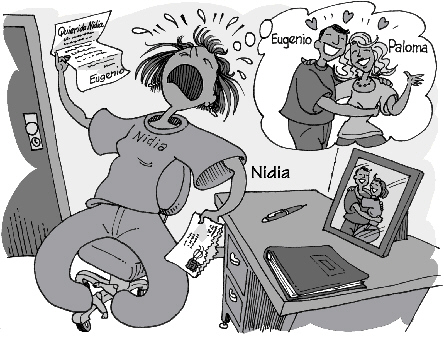La ruptura. Nidia se enteró de que su novio Eugenio se fue con otra chica, y ahora ella le escribe una carta. Escribe el presente del subjuntivo del verbo apropiado entre paréntesis. (6 x 2 pts. = 12 pts.) Eugenio:Estoy triste porque tú ya no me (querer / estar) (1) ____________________. Estoy muy deprimida: no entiendo que tú (poder / ser) (2) ____________________ romper nuestro compromiso tan fácilmente y me enfada que (estar / poner) (3) ______________________ con otra mujer. Me sorprende mucho que Paloma (pedir / pensar) (4) __________________ que lo que haces es correcto. Es una lástima que Uds. (tomar /
Eugenio:Estoy triste porque tú ya no me (querer / estar) (1) ____________________. Estoy muy deprimida: no entiendo que tú (poder / ser) (2) ____________________ romper nuestro compromiso tan fácilmente y me enfada que (estar / poner) (3) ______________________ con otra mujer. Me sorprende mucho que Paloma (pedir / pensar) (4) __________________ que lo que haces es correcto. Es una lástima que Uds. (tomar /
seguir) (5) ___________________ creyendo que fue una buena decisión. ¡Ojalá que Paloma (romper / buscar) (6) ____________________ contigo un día! Nidia(5)
Fill in the blank(s) with the appropriate word(s).
Suggestion: Award one (1) point for the correct verb and one (1) point for the correct subjunctive form. No credit should be given if the wrong verb is chosen.
You might also like to view...
Lesen Sie die Zitate (quotes) von diesen Leuten; dann schreiben Sie sie in indirekte Rede um, wie man sie für eine Zeitung umschreiben würde, also mit Verben im Konjunktiv I (special subjunctive I).
John Vincocour, Korrespondent der New York Times in Bonn: „In Deutschland wird gut, aber mürrisch [disgruntled, surly] gelebt.“ Herr Vincocour meinte, _____________________________________________ ________________________________________________________________.
The committee asked (he, him) to sing the national anthem.
Select the correct pronoun in the parentheses. A) he B) him
All of the following may be a source of evidence in an essay except for which one?
a. Personal observations b. Analogies c. Criteria d. Research reports
Braden’s address:
a. Am Karlstor 3 b. Im Blumengarten 2 c. Am Venusberg 3